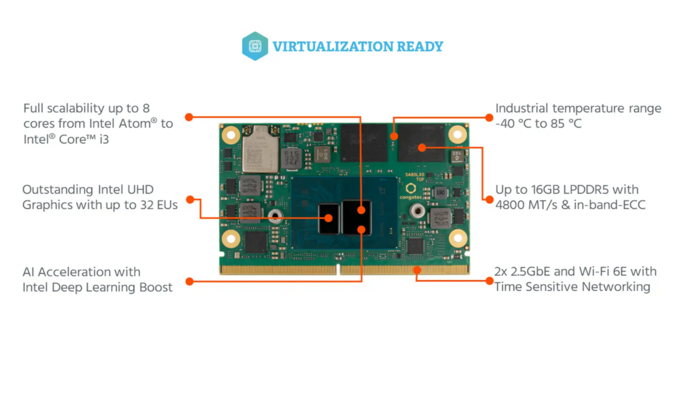
Intel Atom® x7000 Series
8 cores for industrial edge computing
SMARC Computer-on-Modules with Intel Core i3 processors and Intel Atom® x7000 Series
8 cores open extensive virtualization options
Based on Intel Atom® x7000 Series (codenamed Amston Lake/Alder Lake N) and Intel Core i3 processors, the new SMARC modules herald a new level of performance, offering twice as many cores as predecessors with the same power consumption. These are perfect conditions for a massive performance boost at a given TDP. They also greatly simplify virtualization of multiple tasks at the edge. Overall, developers benefit from the following advantages:
- Space- and cost-saving designs thanks to powerful system consolidation with up to 8 cores
- Reliable designs with passive cooling thanks to low power consumption of maximum 15 Watt CPU TDP
- Rugged designs made for industrial temperature ranges from -40°C to +85°C
- Easier design-in with leading credit-card-sized Computer-on-Module form factor
Facts, features, and benefits
| Facts | Features | Benefits |
| SMARC 2.1 Computer-on-Modules | The leading form factor among credit-card-sized Computer-on-Modules. | A comprehensive ecosystem with numerous options for customizing system designs and maximum scalability in the high-performance segment of low-power processors. Supports both Arm and x86 processors. |
| Extended temperature range | Supports the industrial temperature range from -40°C to +85°C. | High reliability and extended applicability in industrial, outdoor, and in-vehicle environments. |
| Soldered memory | Up to 16 GB LPDDR5 RAM with in-band ECC, and up to 256 GB soldered flash memory. | High reliability and data security, even under extreme mechanical loads thanks to high resistance against shock and vibration. |
| Comprehensive real-time capability | Integrated real-time hypervisor plus support for time sensitive networking (TSN) and IEEEE 1588-compliant precision time protocol (PTP). | IIoT applications at the edge can leverage real-time-capable 2-wire Ethernet, among other things, and replace proprietary fieldbus technology. Real-time capability also applies to WLAN. |
| WiFi 6E support | WiFi 6E offers almost three times the data rate of WiFi 5 and more stable connectivity in dense/congested environments. | A cost-effective alternative to using private 5G networks or new Ethernet cabling. |
| TSN over WiFi | Wireless connections become deterministic. | Autonomous mobile robots (AMRs) and automated guided vehicles (AGVs) can interact and be monitored in real time. |
9x faster image classification
More responsive applications thanks to minimized latency
Both the CPU and integrated Intel Gen 12 UHD GPU support INT8-based deep learning inference. The optimized Intel AVX2 (Advanced Vector Extensions 2) and Intel VNNI (Vector Neural Network Instructions) instruction sets enable up to 9x faster image classification. Thanks to minimized latency, users benefit from significantly more responsive applications.
Virtual machines for the edge
Hypervisor-on-Module for consolidated RTOS and GPOS applications
Regardless of whether edge applications use a real-time operating system (RTOS) or general purpose operating system (GPOS) such as Linux or Windows: A firmware-integrated Hypervisor-on-Module makes it easier to consolidate multiple applications on one system. One edge computer can then replace several decentralized controllers and HMIs and securely connect machines and systems to the IIoT.
aReady.COM: An unprecedented level of convenience

The new SMARC Computer-on-Modules with Intel Core i3 and Intel Atom® x7000 Series processors are the first of their kind with aReady.COM option. They are available in application-ready configurations, for instance with the ctrlX OS from Bosch Rexroth and virtual machines for tasks such as real-time control, HMI, AI, IIoT data exchange, firewall, and maintenance/management.
Typical application areas
The SMARC Computer-on-Modules with Intel Atom® x7000 Series and Intel Core i3 processors are suitable for space- and power-constrained systems with passive cooling that require high performance and reliability. The combination of a powerful GPU with optimized AI inference logic enables many new user experiences based on innovative speech and image recognition.
Industrial edge computers
High core count and computing power in a rugged design with passive cooling and soldered memory are ideal for use in industrial automation systems.
Medical imaging
Thanks to their high image classification performance, these processors can be used in compact and portable medical imaging systems to perform complex image processing tasks quickly and efficiently.
Kiosk systems
Industrial temperature support from -40°C to +85°C predestines the modules for use in kiosk systems that are installed at train stations, parking garages, bus stops, or lifts.
Network applications
In network applications like firewalls, routers, and switches, the new modules ensure fast data processing and transmission. Native support of virtual machines that strictly separate security tasks provides high cybersecurity.
IoT devices
In IoT applications such as building automation devices, hand-held devices, and Industry 4.0, the new modules are ideal for collecting, processing, and transmitting data wirelessly.
Surveillance cameras
Deployed in surveillance cameras, the powerful graphics modules can record high-resolution videos, execute motion detection algorithms, and stream data in real time.
Commercial vehicles and mobile machinery
Thanks to their rugged and power-efficient design, they are suitable for driver assistance systems and telematics applications in commercial vehicles and mobile machines.
Robotics
As a central computing unit and thanks to system consolidation, they enable parallel processing of control and image tasks required for precise motion and environmental interaction.
Smart grids
In the energy industry, they are used at the harsh edge to control energy flow, monitor grid status, and optimize energy efficiency.
Comprehensive ecosystem simplifies and accelerates new designs
congatec’s comprehensive SMARC ecosystem optimizes the design process by providing extensive resources, including carrier boards, cooling solutions, design guides, trainings, and individual integration support. This enables customers to accelerate their designs, reduce development time and costs, and bring high-quality, high-performance solutions to the market more efficiently.


